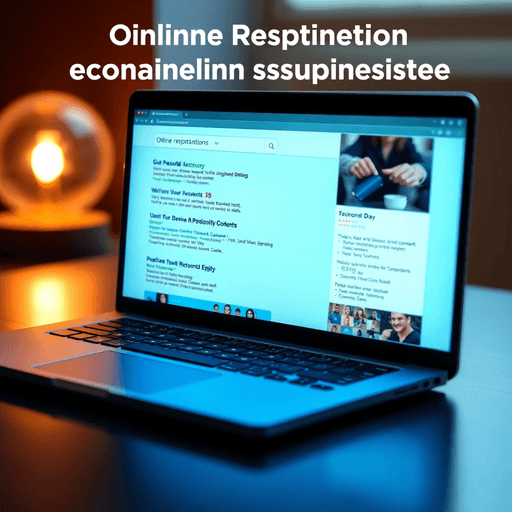Protecting your personal information online has become crucial in today’s digital world. With the vast amount of data available on the internet, Google search results can significantly impact your privacy and reputation. Information such as contact details, addresses, and emails often get indexed by search engines, making it accessible to anyone with an internet connection.
Google’s search results can expose sensitive personal information, leading to risks like identity theft and privacy invasion. Understanding how to remove personal information from Google is essential for safeguarding your online presence.
This article aims to guide you through the process of removing personal information from Google search results. By following these steps, you can take control of your online privacy management and reduce the risks associated with exposed personal data.
However, it’s not just about protecting personal information; managing your online reputation is equally important. Implementing effective corporate communication strategies can enhance brand reputation and drive business success.
In situations where your reputation is at stake, knowing fast reputation repair strategies can be essential for revamping your online presence swiftly. These expert strategies ensure damage control and a strong online presence for future resilience.
For those who prefer a more hands-on approach, there are numerous DIY online reputation management tips available that can help manage online reviews and handle negative feedback effectively.
Moreover, mastering reputation crisis management is crucial in today’s digital landscape. A strong digital reputation not only attracts talent but also boosts market value and enhances customer perception.
Understanding Personal Information Exposure on Google
Personal information exposure in Google search results is a growing concern as more data becomes accessible online. The types of personal details most frequently indexed include:
- Full names
- Home or work addresses
- Personal phone numbers
- Email addresses
- Photographs and social media profiles
- Financial records and legal documents
Google’s search engine indexes content that appears on public-facing websites. When your information is posted on directories, social media, blogs, or forums without adequate privacy settings, web crawlers can quickly add these details to Google’s database. Even seemingly harmless mentions—like a business contact form or a club membership roster—can result in your data showing up in search results.
The risks linked to online data visibility are significant:
- Identity theft: Exposed contact information makes it easier for bad actors to impersonate you or commit fraud.
- Privacy invasion: Stalkers, scammers, or unsolicited marketers often exploit public information.
- Reputational harm: Old forum posts, legal notices, or outdated listings can damage how you’re perceived both personally and professionally.
A single exposed email address can lead to spam attacks; an indexed home address increases the risk of doxxing. These threats illustrate why monitoring what the internet reveals about you is critical for privacy and reputation management.
In some cases, it may be necessary to delete your business from Google Maps if it contains sensitive personal information. This step can help maintain your brand integrity and protect your personal data from unwanted exposure.
Google’s Policy and Tools for Removing Personal Information
Google has a comprehensive removal policy aimed at protecting users from harmful personal content. This policy covers various types of sensitive information that, if exposed, could lead to significant privacy risks and potential harm.
Overview of Google’s Removal Policy
Google’s removal policy is designed to help users take down content that could pose a threat to their privacy or security. This includes:
- Social Security numbers
- Bank account numbers
- Credit card numbers
- Images of signatures
- Sensitive personal information like medical records
The “Results about you” Feature
The “Results about you” feature is a tool provided by Google that allows users to easily locate and request the removal of their personal information from search results. With this feature, you can:
- Identify instances where your personal information appears in Google search results.
- Submit requests directly through the tool to have this information removed.
Types of Content Eligible for Removal
Not all content is eligible for removal under Google’s policy. Some specific types of content that can be taken down include:
- Explicit images shared without consent
- Deepfake pornography
- Content that exposes intimate details (doxxing)
However, there are restrictions:
- Government or educational posts: These often cannot be removed due to their public interest value.
- Public records: Such as court documents which remain accessible.
Understanding these tools and policies is crucial for managing your online presence and protecting your personal information effectively. For instance, if you’re dealing with negative content on Google, there are expert strategies available to help you remove negative content from Google search results and rebuild your reputation.
If the negative content is related to a business profile, you might want to consider removing your Google Business Profile to protect brand consistency and online presence.
In cases where harmful online posts are affecting your reputation, there are expert strategies for removing harmful online content that you can employ. It’s essential to leverage these resources effectively in order to safeguard your online reputation.
Step-by-Step Guide to Requesting Removal of Personal Information from Google
Removing personal data from Google requires a direct approach using the “Results about you” feature. This privacy removal process is designed to help individuals identify and request takedowns of sensitive content that appears in search results.
How to Use the “Results about you” Tool
- Navigate to your Google account and access the “Results about you” dashboard.
- Enter variations of your name, address, phone number, or email. The tool scans indexed content for matches.
- Review flagged results that contain exposed personal details.
Submitting a Removal Request
- Select the specific result containing your information.
- Click “Request removal” and fill out the required form. Details usually include:
- The nature of the personal data (e.g., your home address)
- A valid reason for removal (such as risk of identity theft)
- Supporting screenshots or documentation, if applicable
Google’s Evaluation Process
- After submission, Google reviews your request based on their content takedown steps.
- Common factors considered: public interest, content source, and policy compliance.
- Most requests are processed within days, but complex cases may take longer.
Confirmation and Follow-Up
- You will receive email updates regarding the status of your privacy removal process.
- If approved, Google removes the result from search listings—though it remains on the original website unless addressed by the site owner.
- Revisit your dashboard to monitor new instances and track progress on pending takedowns.
In addition to these personal data removal requests, some individuals or businesses may also need to remove business listings from Google. This step-by-step guide helps ensure that such listings are safely removed, thereby protecting digital reputation.
A structured approach helps you remove personal information from Google efficiently. This hands-on process encourages regular monitoring as new content can appear at any time.
Limitations and Considerations in Google’s Removal Process
Handling a removal request comes with specific restrictions. Google routinely denies removal requests for content that serves the public interest, such as news articles, government documents, and court records. These public records are generally exempt from takedown unless they contain sensitive, non-consensual personal data.
Special Rules for Image Removals Involving Minors
Special rules apply to image removals for minors. If an image features an individual under 18, Google offers a dedicated process for removal regardless of the uploader’s intent. This provision aims to protect young users from privacy risks and unwanted exposure.
Understanding the Limitations of Google’s Delisting
It’s important to understand that even after Google delists certain results, the original content remains on the source website. Search engines only remove links from search listings; they do not erase data from the internet itself. For complete removal, contacting the site owner is essential—otherwise, personal information may still be accessible through direct links or other search engines.
Managing Negative Content Online
In such cases where negative content persists online, employing effective public relations strategies can help manage and improve brand image and online reputation.
Proactive Online Privacy Management Strategies
Regularly monitoring your digital footprint is crucial for online privacy management. Tools like Google’s “Results about you” allow you to keep track of personal information that appears in search results. By frequently checking and updating this tool, you can ensure that any new personal data indexed by Google is swiftly identified and addressed.
Setting up notifications for new indexed personal info is another effective strategy. Many online platforms offer alert systems that notify you when your name or other personal details appear online. This proactive measure helps in timely intervention, reducing the risk of identity theft or privacy invasion.
Using third-party services for broader removal from data brokers and directories can enhance your digital reputation protection. Services such as Fix My Reputation Online specialize in identifying and removing harmful content from various online sources, including data brokers who compile personal information from multiple channels. These services offer a comprehensive approach to maintaining your online privacy by ensuring that your data is not only removed from Google but also from less visible yet pervasive sources.
Key Strategies
- Monitor: Frequently use tools like “Results about you” to track personal info.
- Notify: Set up alerts for new indexed information.
- Remove: Employ third-party services like FMRO to clean up data from brokers and directories.
By implementing these strategies, you can significantly enhance your control over personal information exposure and protect your digital reputation effectively. It’s also essential to master individual online reputation management strategies for success, which can be achieved through individual online reputation management. Furthermore, understanding the value proposition’s essence in reputation management can set your brand apart, attracting loyal customers effortlessly. To improve your online reputation with advanced SEO strategies, consider exploring SEO reputation management services.
Role of Personal Reputation Management in Protecting Online Presence
Professional personal reputation management services play a crucial role in addressing outdated or unfair critiques and past mistakes. These services can help you fix your reputation online by identifying and removing harmful content that negatively impacts your online presence. They specialize in:
- Harmful content removal: Experts in personal reputation management can efficiently remove personal information from Google, ensuring your private details are not accessible to the public.
- Confidentiality and timely action: The value of confidentiality cannot be overstated. By acting swiftly, these services help you rebuild and maintain your online persona without drawing unnecessary attention to past issues.
To learn more about how professional reputation management services can support you, visit our blog for further information and options on how to protect your digital image and manage online reviews.
Reputation management isn’t just about reacting to negative content; it’s also about proactively managing your online presence to prevent future issues. Engaging with these services provides a comprehensive approach to safeguarding your digital footprint and ensuring a positive online image. Utilizing online reputation monitoring tools can help protect your brand and manage your image effectively.
Moreover, mastering crisis management techniques is essential for protecting your brand and maintaining its reputation during tough times. It’s also important to understand the benefits of proactive reputation monitoring, which can safeguard your online reputation and alert you to potential risks early.
Finally, the importance of brand image in marketing cannot be overlooked. A strong brand image not only boosts reputation but also attracts top talent and drives customer loyalty.
Enhancing Your Online Brand Through SEO Best Practices
Leveraging SEO to improve visibility of positive content over negative mentions
Using SEO brand perception strategies can significantly enhance the visibility of positive content, pushing down negative mentions in search results. By strategically targeting keywords relevant to your brand, you can ensure that your positive accomplishments and reputable activities dominate the top search results.
Optimizing website elements for better search rankings
To maximize your presence on search engines, optimizing website elements is crucial. Focus on:
- Meta descriptions: Craft concise and compelling meta descriptions that include targeted keywords.
- Structured URLs: Use clean, keyword-rich URLs that are easy for both users and search engines to understand.
These optimizations help search engines accurately index your site, improving rankings and overall visibility.
Encouraging authentic positive reviews
Positive online reviews are invaluable for boosting credibility and trustworthiness. Encourage satisfied customers to leave genuine reviews on platforms like Google My Business and Yelp. These reviews not only enhance your brand’s reputation but also contribute positively to SEO by increasing engagement and providing fresh content for search engines to index. For instance, you might want to compare 5-star reviews to understand the factors behind high-rated reviews which can help optimize your online reputation for conversions.
Moreover, showcasing these stellar reviews effectively can build trust and drive more business success online. You can find 5-star review examples and tips that could be beneficial in this regard.
Additionally, it’s essential to boost brand trust with online reputation tips. Building brand credibility with positive reviews, engaging content, and a strong social media presence can significantly enhance your online reputation and drive conversions up to 34%.
Lastly, implementing these SEO best practices not only aids in managing your online brand but also plays a crucial role in creating a positive brand image. By telling compelling stories through marketing, you can build emotional connections with your audience, strengthen brand identity, and foster trust – much like successful brands such as Coca-Cola & Dove have done.
Conclusion
Protecting your online presence requires ongoing effort. New search results and data leaks can happen unexpectedly, so it’s important to regularly check and remove personal information from Google. By setting up alerts and using tools specifically designed for online privacy protection, you can ensure that you’re the first to know if any sensitive data reappears.
- Regular self-searches help you find exposed information before it becomes a larger problem.
- Quick action reduces the impact when negative or harmful content shows up.
When you need extra help removing personal information from Google or fixing your online reputation, professional reputation management can give you peace of mind. Experienced advisors like Fix My Reputation Online offer discreet and customized strategies for complete protection, especially when public perception and business interests are involved.
In addition, it’s important to understand business reputation management. This includes using effective strategies to build, protect, and restore your online reputation in order to maintain a strong brand presence.
Remember that prioritizing privacy is not something you do just once, but rather an ongoing commitment. Seek expert guidance when needed to protect both your identity and reputation in the digital world.






